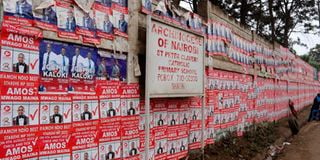Kenyans grapple with pollution caused by campaign posters

Campaign posters litter a wall in downtown Nairobi on August 5, 2022. The posters have become a menace as campaigns end.
When the official campaign season ends today, politicians will leave the country littered with waste paper.
In areas like Nairobi’s Moi Avenue, the campaign posters are plastered on walls, bus terminus and electricity poles.
The same is witnessed in Muthurwa and other towns and market places across the country where hundreds of campaign posters are plastered at different places.
With only two days to the polls, local authorities are grappling with how to clean up the mess after elections are done.
The Elections Act 2011 says that it is an offence to print, publish, distribute or post a placard or poster, which refers to an election, without displaying the name and address of the printer and publisher of the material.
The Kenya National Highways Authority (Kenha) has been able to deter the pasting of posters on highway infrastructure by imposing heavy fines.
A tour of the city shows that no one has dared plaster their posters on their walls lest they risk Sh100,000 fine.
However, lost to many candidates in the polls, both winners and losers, is the fact that there is a law that stipulates removal of campaign materials to curb pollution of the environment.
The National Environment Management Authority (Nema) says it will hold accountable all candidates who have not started clearing their campaign posters from public space after the August 9 General Election.
According to the Environment Management Coordination Act, 2013, all candidates are required to clear campaign materials after elections to prevent pollution.
However, candidates have the option of paying a fee – the environment deposit bond – to facilitate clearance of the posters. The money is usually deposited in the Nema Environment Restoration Fund account.
The act says that any person who hinders or obstructs an environmental inspector in the exercise of his duties fails to comply with a lawful order or requirement made by an environmental inspector commits an offence. The person shall, on conviction, be liable to imprisonment for a term not exceeding two years, or to a fine of not more than Sh500,000 for both.
The act also says those found guilty of polluting the environment with hazardous waste will pay a minimum of Sh1 million in fines or serve jail terms of not less than two years, or both.
In March, Nema wrote to the Independent Electoral and Boundaries Commission (IEBC) to urgently develop clear safeguards that will either reduce the use of posters that lead to littering, or have mechanisms in place that will ensure that the posters are promptly and effectively removed from the environment and properly disposed after electoral campaigns.
“Looking forward to a more productive engagement on this matter to ensure a clean and healthy environment for all, which is also a Constitutional provision (Article 4),” said Nema director-general Mamo Boru Mamo in his letter to IEBC chairman, Mr Wafula Chebukati.





